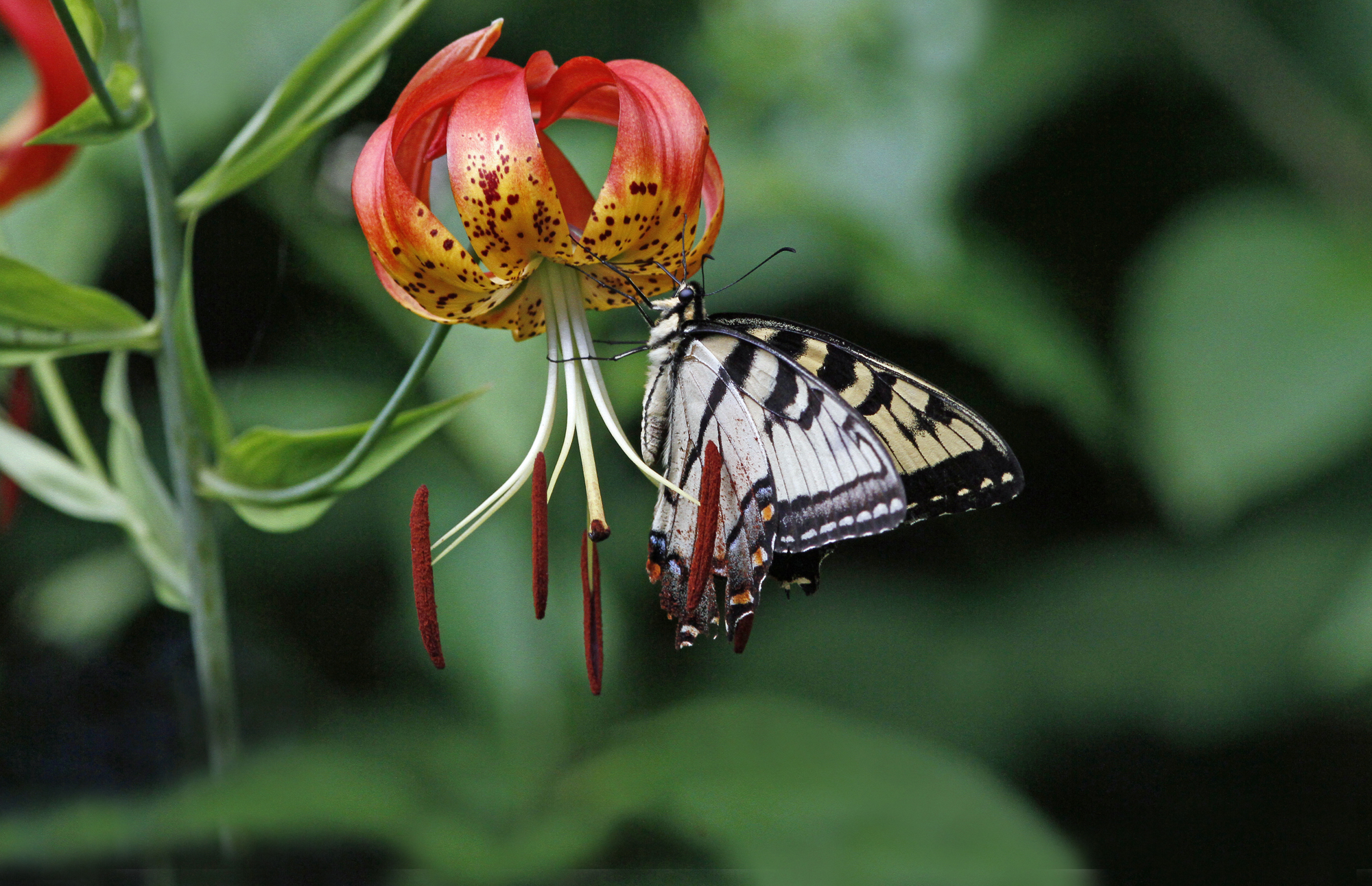Hi Gang,
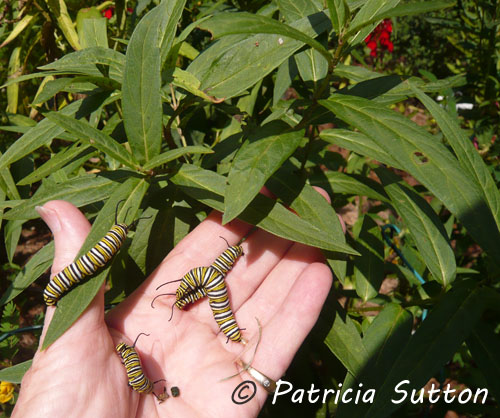
I had so many Monarch caterpillars in my various patches of Milkweed (Butterfly Weed, Swamp Milkweed, and Tropical Milkweed) in August that they stripped some of it bare. Luckily I have a robust stand of Common Milkweed and was able to move many of the still-hungry caterpillars to that stand. I heard from many gardeners who had planted only a few milkweed plants and were unprepared for the bounty of Monarch caterpillars. Lesson: Plant More Milkweed!!!
Afterwards, I was away for a week over Labor Day running 2 butterfly counts in South Carolina (the 26th year I’ve run these counts), and when I returned the Monarch caterpillars in my garden had disappeared, hopefully to safe places where they went into their chrysalis stage.
We’re all hoping that this will be a magical fall at Cape May for Monarch migration. If yesterday (September 25) was an indicator, I think we’re in for a treat. Clay and I played hooky yesterday and walked some of our favorite spots on The Point (the southern tip of NJ): South Cape May Meadows, Cape May Point State Park, Triangle Park in the town of Cape May Point, and the streets of Cape May Point. Despite heavy rain to the north and the west, the sun came out in Cape May and the Monarchs were nectaring in force. One garden on Alexander Avenue in Cape May Point had 50 nectaring Monarchs on a breathtaking stand of Late-flowering Thoroughwort.
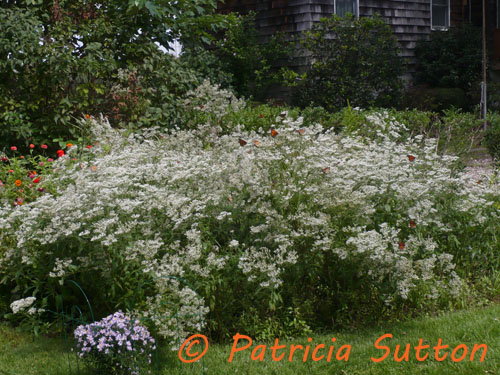
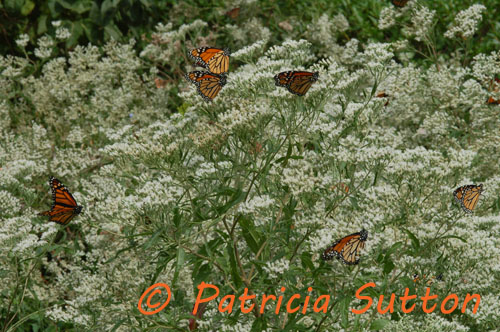
Some falls I and others have enjoyed seeing 100s (some years 1000s) of Monarchs roosting together in the dunes at Cape May Point or in trees in certain yards. Some of these roost sites are used fall after fall. The dune crossover by St. Peter’s By the Sea Church at the intersection of Ocean and Harvard Avenues in Cape May Point is often good. Sometimes on a good flight day, when 100s or 1000s of Monarchs are being blown out to the coast and south to Cape May Point, by late afternoon (2:30 or 3 p.m.) they begin to gather in sheltered spots, where they will spend the night communally. You can view them that evening or early the next morning before the sun hits them and warms them up enough to take off and continue their migration.
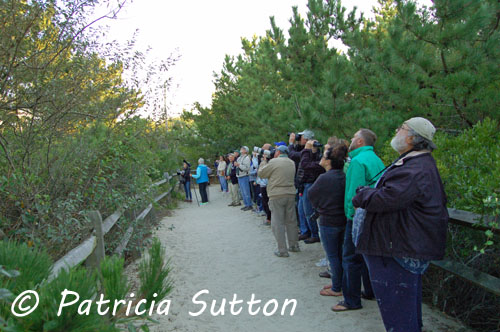
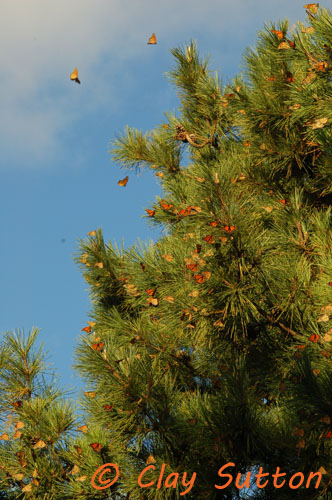
If you would like to keep your finger on the pulse and not miss a big movement of Monarchs at Cape May or an evening roost (or soon-after-dawn departure from that roost), here are a few tips. Follow the Cape May Bird Observatory’s “Cape May Monarch Monitoring Project” at these 3 sites (click on the underlined text / link to reach these sites):
- Monarch Monitoring Project BLOG (updated almost daily in Sept & Oct)
- Monarch Monitoring Project Facebook Page: “Cape May Monarchs”
- Monarch Monitoring Project (primary site with in-depth information)
When you read the Blog, be sure to scroll back and read the September 16th post, “Don’t Bring Monarchs to Cape May.” Share with friends who have either transported Monarchs to Cape May or plan to do so.
This fall there are some great opportunities to learn about migrating Monarchs from the folks studying them. Don’t miss:
MONARCH TAGGING DEMO
Fridays, Saturdays, & Sundays: September 7 to October 14
(weather permitting) 2:00 pm – 2:45 pm
Meets at the East Shelter next to the Hawkwatch Platform at Cape May Point State Park. Join CMBO Monarch Monitoring Project naturalists to learn about the Monarch butterflies that migrate through Cape May. You’ll learn how you can help with Monarch conservation. After the talk, watch as small tags are affixed to Monarchs to track their migration. No preregistration necessary. Family-friendly. Cost: FREE.
MONARCH MONITORING PROJECT DROP-IN
September 10 through October 25
Mondays, Tuesdays, Wednesdays & Thursdays only
1:00 – 1:30 pm
Stop by Triangle Park, at Lighthouse and Coral Avenues in Cape May Point to learn about the Monarch Monitoring Project. The team may be tagging monarchs, tending to the gardens that support the monarchs, or engaged in other project activity. No reservations needed for this free program, but contributions to the Monarch Monitoring Project are welcome.
2nd ANNUAL MONARCH FESTIVAL
Sunday, October 7
10:00 am – 4:00 pm
At the Nature Center of Cape May (1600 Delaware Avenue, Cape May, NJ). The festival will include educational programs, butterfly tagging demonstrations, children’s crafts, along with music and food! Join in the celebration and learn why this area is so special to the migration of the butterflies and what you can do to help conserve wildlife. Suggested $5 donation to support the nature center programs throughout the year. Call the NCCM at 609-427-3045 with any questions about the festival.
Enjoy this fall’s Monarch migration!
Pat
